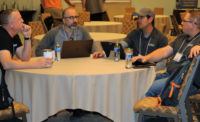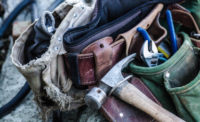Lance Clark, a 42-year veteran of the unionized sheet metal industry, was recognized as the 2021 inductee in the Testing Adjusting and Balancing Bureau (TABB) Hall of Fame. He is the 19th person inducted into the elite group of individuals who have dedicated their service to TABB and to the International Association of Sheet Metal, Air, Rail and Transportation (SMART) workers.
Where Clark differs from the other 18 Hall of Fame members is he doesn’t have a formal testing, adjusting, and balancing (TAB) background. For nearly 20 years, he served as the training administrator of Sheet Metal Workers Local 105 near Los Angeles. In 2007, with about 3% of contractors in the area bidding TAB work, he successfully pushed for the creation of a $2.8 million, 5,000-square-foot TAB lab, where local members and those from across the country could come to train and complete various certification exams.
Clark saw opportunity on the horizon, and he felt sheet metal workers should be there to make the most of it.
“All I know is you need to have the lab so you can train members properly, so you can control the work, which awards the work to your contractor,” Clark said. “It’s our equipment; we should balance our own stuff.”
He sat down with local HVAC and TAB contractors to encourage them to send their employees for training, so they could bid those TAB projects. He leaned on John Hamilton, TABB director of implementation, and fellow TABB Hall of Famer Erik Emblem for support and direction.
“I never believed in giving work away, because you never get it back,” he said.
Clark was inducted into the TABB Hall of Fame for his vision and ability to push the industry forward, even when it was, at first, uncomfortable, said Duane Smith, International Certification Board/TABB director of certification.
“You have someone who doesn’t have a TAB background, but they’re in a leadership position, and they have that transformational mindset that if they’re not doing it now, they see the benefits in the future,” Smith said. “It would be easy to say, ‘we’re doing fine with what we’re doing’ and not look ahead, but that’s how programs die.”
Clark officially entered the apprenticeship in 1979 — after two years as a helper — at Sheet Metal Workers Local 103 in Billings, Montana, where he made $3.41 per hour as an indentured apprentice. Local 103 covers Montana, a portion of Idaho and the northern half of Wyoming. This meant, even as an apprentice, Clark spent a lot of time on the road.
“You were never home to see your kids’ Christmas plays,” he said. “It finally got to the point where I was gone so much my wife had to take care of everything in addition to work and taking the kids to school. All I wanted was to be able to sleep in my own bed and be there for my family. So, we decided to give California a try.”
In 1987, Clark moved the family farther west to Southern California, where his leather chaps and boots did not go unnoticed. His skills didn’t, either. Because of his extensive travel and work in national parks and Native American lands, Clark held welding certifications peers in California had never seen. Not only did this skill set make him a highly sought-after welder, it prompted leadership at then-Local 420 to offer him a teaching position.
In the mid-1990s, Clark ran for office and was serving as the business manager when former general president Mike Sullivan approached Clark and Roy Ringwood (TABB Hall of Fame, 2016) to form the new Local 105, resulting from the merger between Locals 102 and 108.
“This one came together because of growth,” Clark said. “Roy became the business manager, and I became the financial secretary/treasurer of Local 105, which had just become the second-largest local in the union in 2002.”
Clark took over as administrator of training at the Local 105 training center in 2006, shortly before he proposed the TAB lab project, which the school paid for in cash. He retired from the trade in August 2021.
“Building that lab in 2007 set the standard,” he said. “It’s amazing. The place we started out at and where we are today — we had people from all over the country come to test, so they could, in turn, control the work in their areas, too.”
Although Clark doesn’t think of himself as a “TAB guy,” he said, his two sons, Austin and Bridger Clark, are TAB professionals in Southern California.
“Even though I don’t know anything about air balance technically — I leave that to people smarter than me — I ran a lot of big jobs,” Clark said. “And as long as you treated everyone fairly, you didn’t really have to worry about a member’s performance on the job. That normally worked itself out, if you know what I mean.”
The ICB/TABB program has American National Standards Institute (ANSI) accreditation for certification in the TAB industry. Certification is a statement that the technician, supervisor and contractor demonstrate the highest level of professional expertise.
For the full list of TABB Hall of Fame inductees, visit https://www.nemiconline.org/tabb-hall-of-fame.




